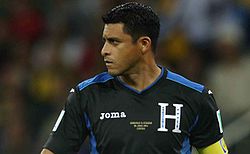
The CONCACAF Gold Cup is North America's major tournament in senior men's football and determines the continental champion. Until 1989, the tournament was known as CONCACAF Championship. It is currently held every two years. From 1996 to 2005, nations from other confederations have regularly joined the tournament as invitees. In earlier editions, the continental championship was held in different countries, but since the inception of the Gold Cup in 1991, the United States are constant hosts or co-hosts.
Contents
- Overall record
- Match overview
- Record by opponent
- 1981 CONCACAF Championship
- Final table
- Squad
- Individual records
- See also
- References
From 1973 to 1989, the tournament doubled as the confederation's World Cup qualification. CONCACAF's representative team at the FIFA Confederations Cup was decided by a play-off between the winners of the last two tournament editions in 2015 via the CONCACAF Cup, but was then discontinued along with the Confederations Cup.
Since the inaugural tournament in 1963, the Gold Cup was held 28 times and has been won by seven different nations, most often by Mexico (13 titles).
Honduras have won the title once, in 1981, at one of their two home tournaments. They had already been hosts in 1967, where they finished in third place. Ranking fourth on the all-time table, they are one of the most successful teams in the North American Federation. From 2005 to 2013, they reached the semi-finals on four out of five occasions, although they never reached the final during that time. In 1991, Honduras played their only true final, which they lost to the United States after the eighth round of a penalty shoot-out. Before 1991, the tournament was contested in groups rather than knockout matches.